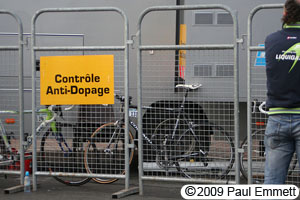 Manolo Saiz, a central figure in cycling’s biggest doping scandal, says he would now like to return to the sport. He told Diario Vasco newspaper today that cycling “is my world, so it’s only natural to return.” Saiz was arrested on May 23, 2006 in connection with Operación Puerto, resulting in his company Active Bay being stripped of its ProTour license.
Manolo Saiz, a central figure in cycling’s biggest doping scandal, says he would now like to return to the sport. He told Diario Vasco newspaper today that cycling “is my world, so it’s only natural to return.” Saiz was arrested on May 23, 2006 in connection with Operación Puerto, resulting in his company Active Bay being stripped of its ProTour license.
At the time of his arrest he was directing the Spanish Liberty Seguros team. More than 50 cyclists were implicated in the blood-doping scanal.
The 50-year-old, who is now a partner in a restaurant-brewery in Torrelavega, said he didn’t watch a single race following his arrest until last year. Two-time Tour de France champion Alberto Contador and last year’s Vuelta a Espana winner Alejandro Valverde both rode under Saiz’ direction on his Liberty Seguros team.
Valverde is set to challenge a two-year ban imposed by Italy’s Olympic Committee in the Court of Arbitration for Sport next week involving the case. Then the Spaniard will face-off against the UCI and WADA, as they work to force the Spanish Cycling Federation to to open a disciplinary procedure against the rider, believing they have proof of his Puerto involvement.
Former professional cyclist Jesús Manzano has been called to testify at the first Valverde hearing next week. He is the individual responsible for bringing attention to systematic doping in Spanish cycling, and was his statements that led the Guardia Civil to conduct the Operación Puerto investigation that revolved around Spanish sports doctor Eufemiano Fuentes.
After four years of silence on the advice of his lawyers, the Spaniard said he is ready to talk about the case a little more openly. But with the legal proceedings still alive he said he won’t reveal too many details.
“It gives me great pain to see the lies that this sport lives,” Saiz told the newspaper as the main reason he couldn’t watch it on television. He also said it was difficult to watch his former riders compete. “The riders who are succeeding are those that I had in my team and that is very, very hard to digest.”
When asked if politics were involved in the case he said that some took advantage of the time, but when asked to name names, he said it wasn’t the right time. He also said that he wasn’t planning on writing a book, because he wouldn’t want to “harm the sport”.
In the interview he lashed out saying that doping is not the problem in cycling, it is the leadership within the sport. “I think the problem with cycling is not doping but a lack of ability at the top by its leaders,” he said, pointing out that he thinks that the delay in processing of doping positives is a big part of the problem.
The UCI has taken a hard stance against cheaters in the sport, and since the Operación Puerto broke in 2006, have been working diligently to eradicate doping in cycling. Their revolutionary biological passport system started to bear fruit during the 2009 season, and will soon begin to make its way into other sports.